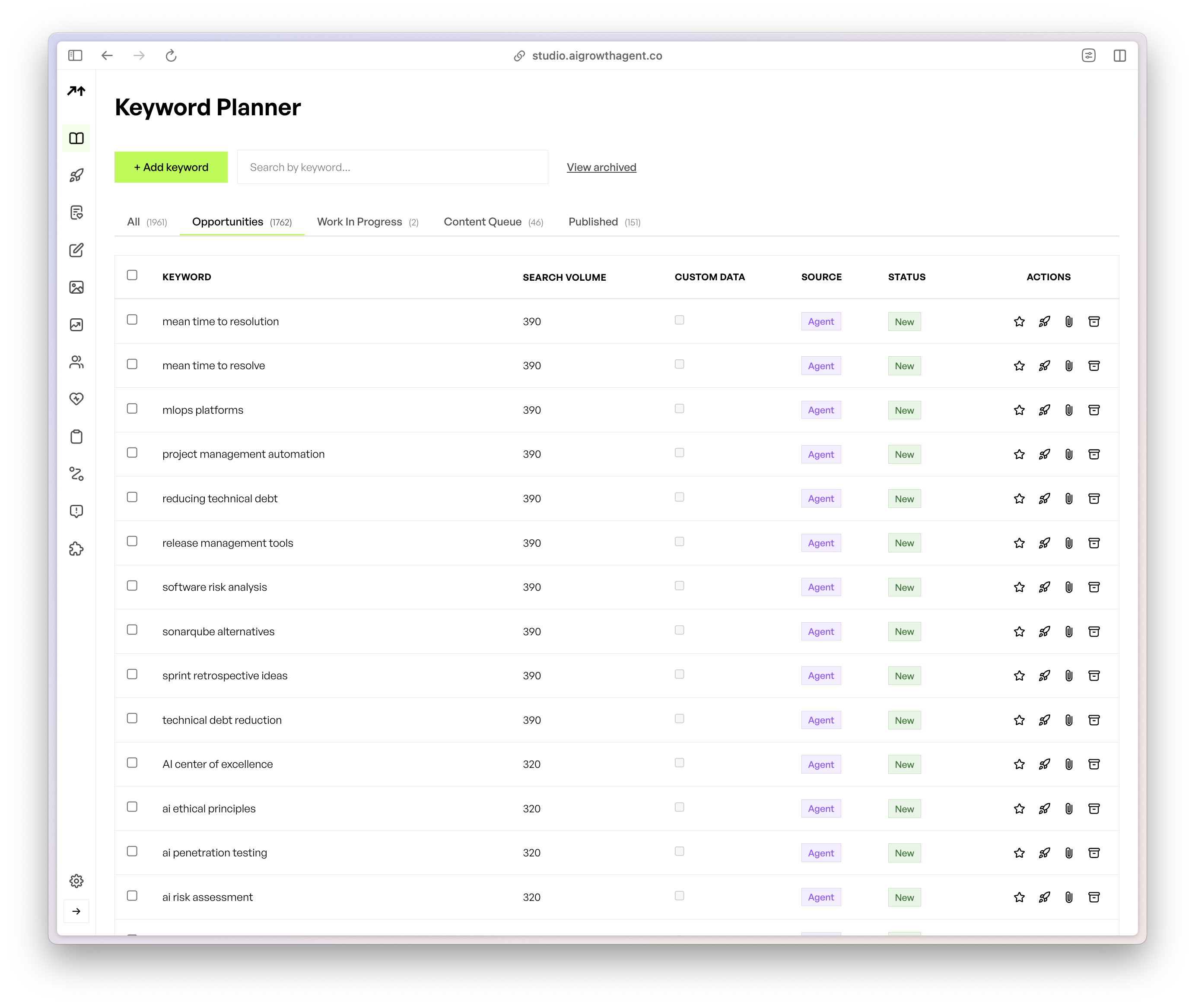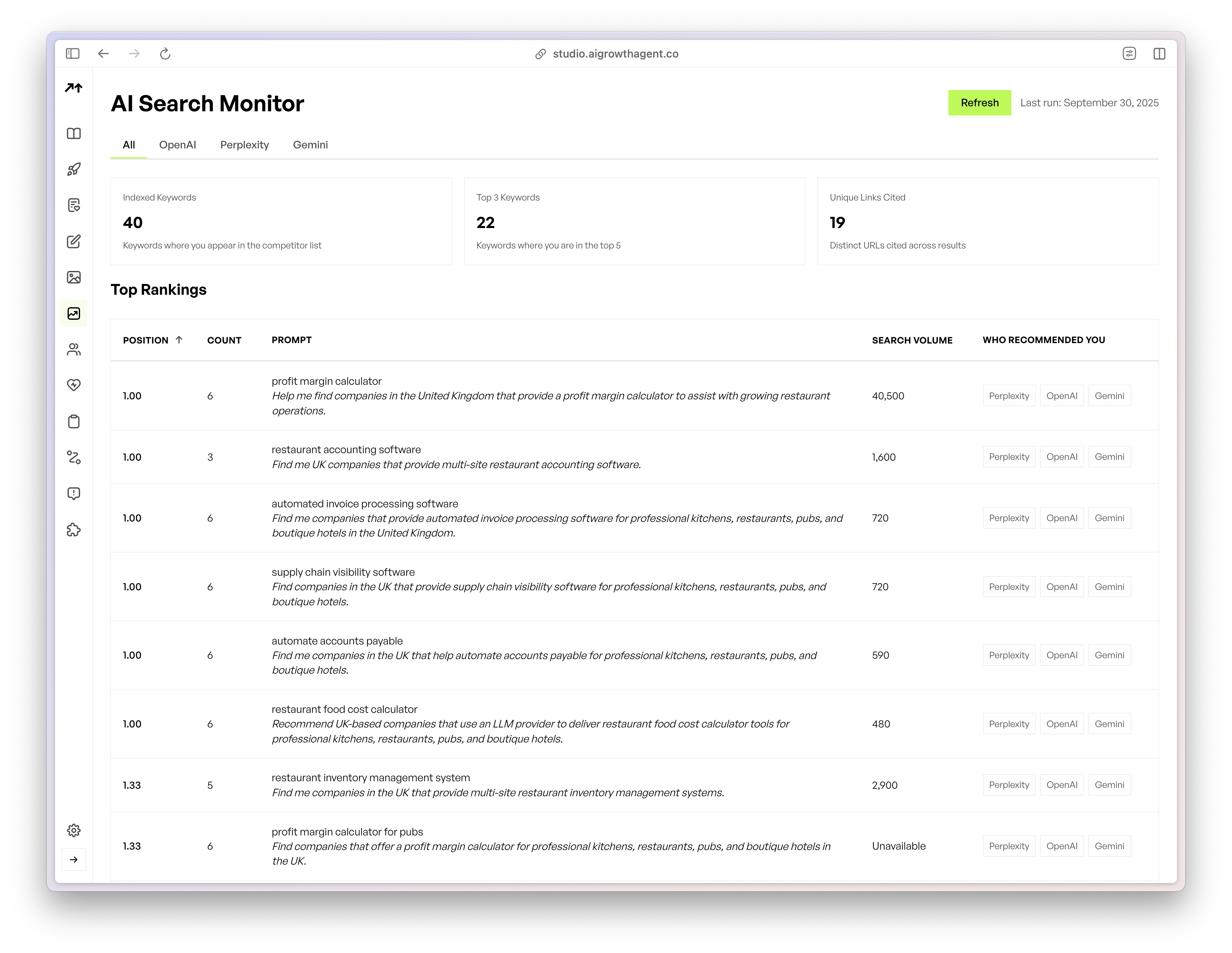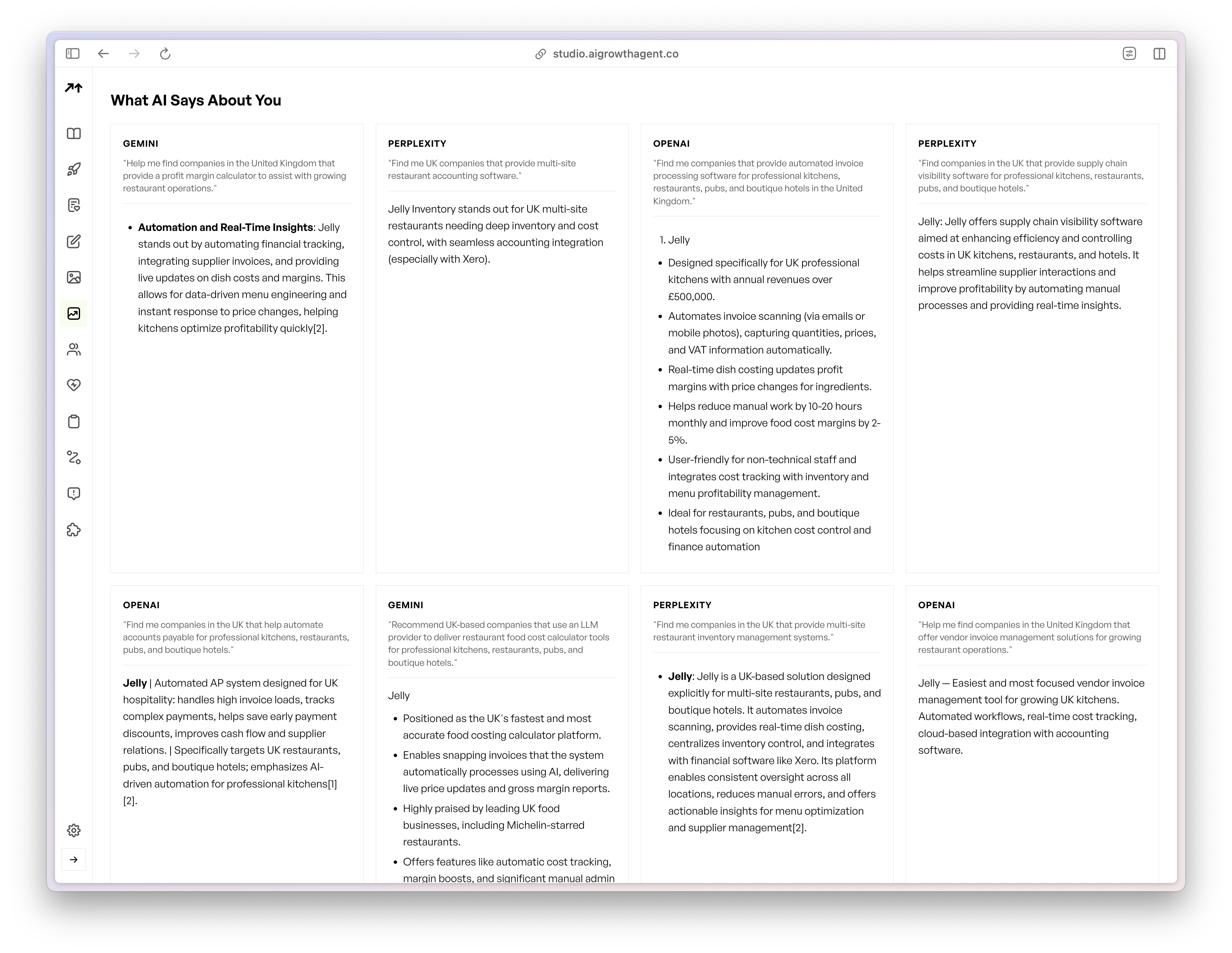The way buyers discover solutions has changed dramatically. Traditional search engines aren’t the main path anymore. AI-powered platforms like ChatGPT, Gemini, and Perplexity now play a major role in how buyers find and evaluate options. Many existing marketing strategies no longer work in this AI-driven landscape, and companies must adapt to stay visible.
Your brand’s online presence could shrink without action. As AI generates more content across the web, your voice gets quieter unless you adjust to this shift. Relying on a couple of blog posts each month won’t cut it. It risks letting competitors shape how AI platforms present your industry.
This guide offers marketing leaders a clear framework to optimize content for every stage of the funnel, from awareness to conversion, with a focus on AI visibility and authority. The need to adapt is urgent. Falling behind means losing ground to competitors who position themselves as key players in AI search results.
Adapting isn’t just about creating more content. It’s about rethinking how content works at each funnel stage to ensure AI platforms recognize and recommend your brand.
Understanding the AI Search Shift in Marketing
How AI Search Changes Content Strategy
AI has redefined how businesses connect with customers online. In the past, ranking on search engines meant focusing on keywords and backlinks. Now, success comes from becoming a trusted source that AI platforms might reference or recommend.
Large Language Models value detailed, authoritative content when crafting responses. Unlike traditional search engines that list multiple results, AI often delivers a single, focused answer. Your brand needs to stand out as the go-to reference in your category.
This change brings both challenges and opportunities. Companies building authority in AI systems can gain significant visibility. Those less present risk fading into the background as AI-generated content grows daily.
Marketing funnel content must now serve two goals: inform human buyers and establish credibility within AI systems that influence discovery.
Why Competitors Might Shape Your Brand’s Story in AI Search
Standing still in AI search is a major risk. If your brand lacks enough relevant content to address user questions, AI platforms may turn to competitors. Their perspectives could become the default narrative about your market.
Proactive companies gain an edge. They not only increase their chances of being cited but also shape how AI interprets industry trends and challenges. If your content is sparse, competitors might define the standards for evaluating solutions.
Buyers now lean heavily on AI tools for research, especially in technical fields where expertise is critical. When AI provides summaries or suggestions, it prioritizes brands with strong content tailored for visibility.
Acting early matters. Companies that optimize for AI search now can build lasting advantages over those who delay.
Optimizing Each Stage of the Marketing Funnel for AI Search
Top of Funnel: Establishing Authority for AI Citation
At the awareness stage, content must do more than grab attention. It needs to position your company as an expert that AI systems can reference when discussing industry issues or trends.
Buyers often shift from limited awareness to discovery through AI responses, as seen in how potential customers first encounter brands. AI platforms answer broad questions by pulling from detailed content, so your material should focus on staying relevant, which is the purpose of awareness content.
Focus on educational, non-promotional content that highlights problems and solutions with authority. Resources like industry guides or trend analyses work well for this stage, as suggested by effective awareness strategies.
Here are key content types for building AI awareness:
- Comprehensive industry guides that explain core concepts.
- Problem-solution analyses addressing common challenges.
- Trend insights showing your grasp of market shifts.
- Thought leadership pieces that offer unique perspectives.
Technical optimization also plays a role. AI systems rely on clear signals of relevance, like structured data and schema markup, to parse and prioritize content.
Middle of Funnel: Providing AI-Validated Solutions
In the consideration stage, buyers know they have a problem and seek options, often through AI tools.
Research is a big part of this stage. About 81% of buyers investigate options before deciding, increasingly via AI platforms, according to current shopping trends.
Your content must offer clear, reliable information for AI to summarize. Focus on addressing specific challenges and building trust with evidence, hitting consideration content goals. Key content types include:
- Data-driven case studies showing real results.
- Comparative analyses highlighting your strengths.
- Expert webinars explaining complex topics.
- ROI tools or whitepapers offering actionable insights.
- Testimonials embedded in educational content.
AI favors detailed answers to complex queries, so ensure your material covers topics thoroughly.
Bottom of Funnel: Encouraging Action with AI-Friendly Content
At the conversion stage, buyers are ready to choose. Content must be precise and structured for AI systems that may sway final decisions by highlighting your solution.
While buyers intend to act, AI tools often assist in confirming choices. Your content should support these evaluations with clear details, generating effective conversion tactics.
Prioritize streamlined content that guides decisions and reinforces earlier authority. Focus on:
- Product pages optimized for AI summaries.
- Feature breakdowns showing specific benefits.
- Transparent pricing and differentiators.
- Strong calls to action driving next steps.
Technical details matter here. AI needs structured data on product capabilities and impact to present accurate information to users.
Building an AI-First Content Strategy with AI Growth Agent
Why Content Volume and Technical Setup Matter for AI
For leaders, producing content regularly gives a competitive edge in AI search. AI systems value fresh, in-depth material, making daily publishing a practical standard.
Traditional agency models, reliant on human effort, often fall short. They might deliver a few pieces monthly, nowhere near the volume needed for AI relevance.
AI Growth Agent tackles this with an autonomous platform. Our Content Agent manages everything from planning to optimization, supporting daily output without compromising quality.

Technical setup for AI goes beyond standard SEO. It includes advanced schema markup and LLM.txt files to aid AI indexing. Many teams lack this expertise.
AI Growth Agent handles these needs, implementing tailored schema, LLM.txt files, and a unique Model Context Protocol to help AI interpret content accurately.
Key Steps for Lasting AI Search Visibility
Achieving consistent AI search visibility requires a structured plan, not just isolated efforts. Companies succeed by ensuring their content becomes a go-to for AI systems.
Repurpose existing material for AI readability. Format insights as Q&A or topic clusters to highlight expertise.
Spot areas where AI gives vague answers. Create targeted content to fill those gaps and build authority.
AI Growth Agent’s AI Search Monitor and Performance Agent offer insights across platforms like ChatGPT, Gemini, and Perplexity. Track cited content, competitor positions, and untapped opportunities.

Monitor AI search regularly for brand mentions and competitor activity. Use these metrics to refine your content approach.
Solving Common AI Content Challenges with AI Growth Agent
Leaders often struggle to adapt content for AI search. Technology offers practical ways to address these hurdles.
One issue is sticking to old SEO methods focused on keywords instead of authority. These tactics don’t align with AI priorities.
AI Growth Agent shifts focus to authority with detailed content, positioning your brand as a category leader.
Another challenge is creating generic content that fails to stand out. Such material often gets overlooked by AI systems.
Our platform uses research and a Core Content Agent to deliver unique, expert-level content tailored to your context.
Many underestimate the content volume needed for AI success. Without enough high-quality output, authority slips away.
AI Growth Agent supports daily publishing at scale, ensuring consistent quality through automation.
Lastly, internal teams may lack the skills for AI content optimization. Managing technical demands can overwhelm resources.
Our end-to-end solution takes on the full process, from strategy to publishing, easing the burden on your team.
Comparing Traditional and AI-Optimized Funnel Content
|
Aspect |
Traditional Approach |
AI-Optimized Approach |
AI Growth Agent Solution |
|
Publishing Frequency |
1-2 posts per month |
Daily high-quality content |
Autonomous daily publishing |
|
Content Focus |
Keyword targeting |
Authority and citation building |
AI-first authority optimization |
|
Technical Optimization |
Basic meta tags |
Advanced schema, LLM.txt |
Model Context Protocol integration |
|
Content Depth |
Surface-level coverage |
Comprehensive expertise |
Research-driven authority content |
Common Questions About AI Search Content Optimization
How Does AI Search Content Differ from Traditional SEO?
AI search content focuses on building authority rather than just targeting keywords. Traditional SEO relied on technical tricks and links to rank. AI optimization aims to make your brand a trusted reference through in-depth, consistent content.
What Makes Content Authoritative for AI?
AI judges authority by content depth, original ideas, accuracy, and technical structure. This means offering practical insights, case studies, and regular updates. Non-promotional, detailed resources tend to rank higher.
Can AI-Generated Content Match Human-Written Content for AI Visibility?
Yes, AI-generated content can perform well if carefully crafted. Success depends on research quality, technical setup, and strategy. Basic tools might produce generic output, but AI Growth Agent creates authoritative content with deep context.
What Are LLM.txt Files and Their Role in Content?
LLM.txt files are structured data that guide AI in understanding your content’s organization and topics. They help AI categorize material across funnel stages, ensuring relevant citations for user queries.
How Often Should Companies Publish for AI Search?
Daily publishing is a realistic target to stay relevant in AI search. AI values fresh, consistent content. Quality remains critical, so each piece must meet high standards. Autonomous platforms like ours make this volume achievable.
Conclusion: Position Your Brand for AI Search Success with AI Growth Agent
Adapting marketing content for AI search is essential to maintain authority in today’s digital space. Companies that embrace this change can stand out, while those stuck in old methods may lose visibility.
AI search calls for a content pace and technical depth that traditional approaches can’t match. Daily publishing and advanced optimization are beyond the reach of most agencies or internal teams. AI Growth Agent provides an automated, effective solution for leading brands.
The time to act is now. Early adopters of AI content strategies can secure strong positions. Waiting risks letting competitors define your market narrative as your presence weakens.
AI Growth Agent delivers a complete system to elevate premium brands in AI search. Our platform creates authority-driven content ecosystems to ensure AI platforms recognize your brand as a key resource.
